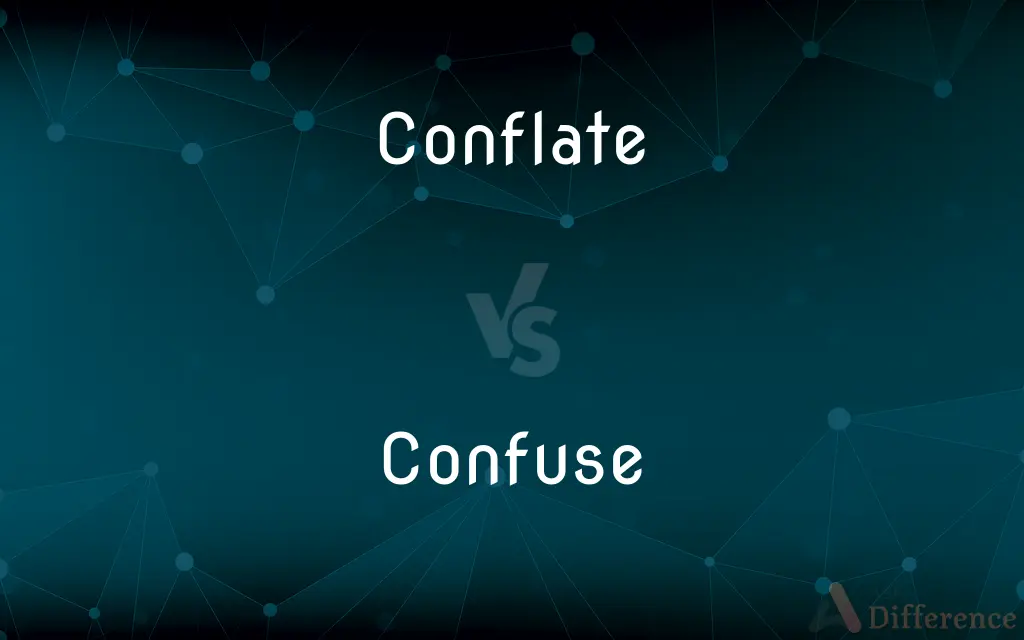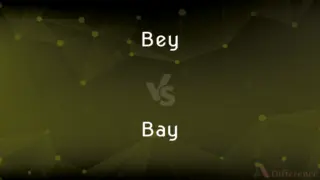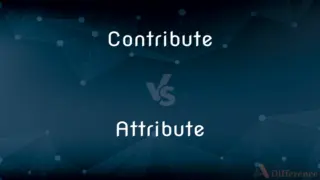Conflate vs. Confuse — What's the Difference?
Edited by Tayyaba Rehman — By Fiza Rafique — Updated on October 29, 2023
"Conflate" means to merge two distinct concepts into one; "Confuse" means to mistake one thing for another or to lack clarity.

Difference Between Conflate and Confuse
Table of Contents
ADVERTISEMENT
Key Differences
"Conflate" primarily refers to the blending or merging of two distinct entities or ideas into a single one. On the other hand, "Confuse" indicates a lack of clear understanding or the mixing up of things unintentionally. Conflation is often the act of intentional merging, while confusion arises from misunderstanding.
In the realm of discussions and debates, to "Conflate" would mean to combine two arguments or ideas, sometimes misleadingly. "Confuse," in this context, would indicate that someone doesn't clearly distinguish or comprehend the points being made. Conflation can lead to oversimplification, while confusion results from lack of clarity.
For instance, one might "Conflate" the roles of two historical figures, suggesting they had similar impacts. To "Confuse" these figures would mean mistakenly believing one to be the other. While conflation is a deliberate fusion, confusion can be an unintentional error.
Another layer of distinction lies in their usage. "Conflate" is often used in analytical or scholarly contexts, indicating an improper merging of concepts. "Confuse" is broader in its application, suggesting a general lack of clarity or misunderstanding in various situations.
Comparison Chart
Meaning
Merge two distinct concepts into one.
Mistake one thing for another or lack clarity.
ADVERTISEMENT
Typical Usage
Intentional merging of ideas or entities.
General misunderstanding or lack of distinction.
Grammatical Class
Verb.
Verb.
Contextual Example
Merging two theories into one.
Mistaking one person for another.
Potential Outcome
Oversimplification or misleading combination.
Misinterpretation or error.
Compare with Definitions
Conflate
Merge two different concepts or entities.
She conflated the two historical events in her essay.
Confuse
Fail to distinguish between; mix up.
People often confuse confidence with arrogance.
Conflate
Blend together, especially in a way that makes the original elements hard to distinguish.
The movie conflates reality and fiction.
Confuse
To mix up in the mind.
He always confuses Jane with Joan.
Conflate
Combine two or more sets of information or ideas.
People often conflate love and infatuation.
Confuse
Cause someone to feel bewildered.
His sudden change of plan might confuse the team.
Conflate
To regard or represent as equivalent or comparable.
It's a mistake to conflate education with school attendance.
Confuse
Make more complex or difficult to understand.
The numerous options can confuse a new buyer.
Conflate
Join together; amalgamate.
The play conflates various genres into a unique style.
Confuse
Make (someone) bewildered or perplexed
Past and present blurred together, confusing her still further
Conflate
Combine (two or more sets of information, texts, ideas, etc.) into one
The urban crisis conflates a number of different economic, political, and social issues
Confuse
To cause to be unable to think with clarity or act with intelligence or understanding; bewilder or perplex.
Conflate
To bring together; meld or fuse
"The problems [with the biopic] include ... dates moved around, lovers deleted, many characters conflated into one" (Ty Burr).
Confuse
(Archaic) To cause to feel embarrassment.
Conflate
To combine (two variant texts, for example) into one whole.
Confuse
To fail to differentiate (one person or thing) from another
Confused effusiveness with affection.
Conflate
To fail to distinguish between; confuse. See Usage Note below.
Confuse
To make more complex or difficult to understand
"The old labels ... confuse debate instead of clarifying it" (Christopher Lasch).
Conflate
To bring (things) together and fuse (them) into a single entity.
Confuse
To make something unclear or incomprehensible
A new tax code that only confuses.
Conflate
To mix together different elements.
Confuse
(transitive) to puzzle, perplex, baffle, bewilder somebody; to afflict by being complicated, contradictory, or otherwise difficult to understand
It confused me when I went to the office and nobody was there, but then I realised it was Sunday.
Conflate
(by extension) To fail to properly distinguish or keep separate (things); to mistakenly treat (them) as equivalent.
“Bacon was Lord Chancellor of England and the first European to experiment with gunpowder.” — “No, you are conflating Francis Bacon and Roger Bacon.”
Confuse
(transitive) To mix up, muddle up one thing with another; to mistake one thing for another.
People who say "hola" to Italians are confusing Italian with Spanish.
Conflate
Combining elements from multiple versions of the same text.
Confuse
(transitive) To mix thoroughly; to confound; to disorder.
Conflate
(biblical criticism) A conflate text, one which conflates multiple version of a text together.
Confuse
To make uneasy and ashamed; to embarrass.
Conflate
To blow together; to bring together; to collect; to fuse together; to join or weld; to consolidate.
The State-General, created and conflated by the passionate effort of the whole nation.
Confuse
To rout; discomfit.
Conflate
To ignore distinctions between, by treating two or more distinguishable objects or ideas as one; to confuse.
Confuse
(intransitive) To be confused.
Conflate
Mix together different elements;
The colors blend well
Confuse
Mixed; confounded.
Confuse
To mix or blend so that things can not be distinguished; to jumble together; to confound; to render indistinct or obscure; as, to confuse accounts; to confuse one's vision.
A universal hubbub wildOf stunning sounds and voices all confused.
Confuse
To perplex; to disconcert; to abash; to cause to lose self-possession.
Nor thou with shadowed hint confuseA life that leads melodious days.
Confused and sadly she at length replied.
Confuse
Mistake one thing for another;
You are confusing me with the other candidate
I mistook her for the secretary
Confuse
Be confusing or perplexing to; cause to be unable to think clearly;
These questions confuse even the experts
This question completely threw me
This question befuddled even the teacher
Confuse
Cause to feel embarrassment;
The constant attention of the young man confused her
Confuse
Assemble without order or sense;
She jumbles the words when she is supposed to write a sentence
Confuse
Make unclear or incomprehensible;
The new tax return forms only confuse
Confuse
Make unclear, indistinct, or blurred;
Her remarks confused the debate
Their words obnubilate their intentions
Confuse
To disorder; disarrange.
Strong emotions can confuse one's thoughts.
Common Curiosities
What does it mean to "confuse" two concepts?
It means to mistakenly believe one concept is the other or to mix them up without understanding.
Can "conflate" and "confuse" be used interchangeably?
Not always. "Conflate" means to merge intentionally, while "confuse" implies a lack of clarity or mix-up.
Is "conflate" commonly used in academic discussions?
Yes, it refers to improperly merging two distinct concepts or arguments.
What might be the outcome of conflating two ideas?
It can lead to oversimplifications or misunderstandings.
Can a person "conflate" without realizing it?
Yes, one might unintentionally merge concepts believing they're the same.
Is "conflate" always about ideas or concepts?
Mostly, but it can also refer to entities or sets of information.
Can one "confuse" without intending to?
Yes, "confuse" often implies unintentional mix-ups or misunderstandings.
Is confusion always about misunderstanding?
Mostly, but it can also refer to feeling bewildered or having disordered thoughts.
Is "confuse" broader in meaning than "conflate"?
Yes, "confuse" can be applied in various contexts, while "conflate" is specific to merging.
Is "conflate" always a negative action?
Not necessarily, but it can lead to oversimplification or misleading representations.
Why is it important not to conflate distinct concepts?
Conflating can lead to inaccuracies, oversimplifications, or misrepresentations.
Can one be confused because of conflated ideas?
Yes, if ideas are improperly merged, it can lead to confusion.
Does "conflate" always mean combining two things?
Typically, but it can also mean merging multiple concepts or entities.
Can "confuse" refer to emotional bewilderment?
Yes, one can be "confused" emotionally, feeling uncertain or mixed up.
Can "confuse" be used in a positive context?
It's typically neutral but often implies negative outcomes due to misunderstandings.
Share Your Discovery

Previous Comparison
Bey vs. Bay
Next Comparison
Contribute vs. AttributeAuthor Spotlight
Written by
Fiza RafiqueFiza Rafique is a skilled content writer at AskDifference.com, where she meticulously refines and enhances written pieces. Drawing from her vast editorial expertise, Fiza ensures clarity, accuracy, and precision in every article. Passionate about language, she continually seeks to elevate the quality of content for readers worldwide.
Edited by
Tayyaba RehmanTayyaba Rehman is a distinguished writer, currently serving as a primary contributor to askdifference.com. As a researcher in semantics and etymology, Tayyaba's passion for the complexity of languages and their distinctions has found a perfect home on the platform. Tayyaba delves into the intricacies of language, distinguishing between commonly confused words and phrases, thereby providing clarity for readers worldwide.














































